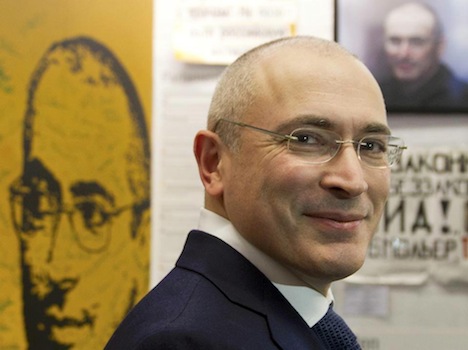In connection with a wide-ranging amnesty bill that also freed the anti-Putin members of the punk band Pussy Riot, former Yukos president Mikhail Khodorkovsky was released from prison earlier this week.![]()
Though Russian media are hailing the move as an act of grace by Russian president Vladimir Putin, it’s lot less magnanimous than it looks — after ten years in prison, Khodorkovsky was due to be released in 2014 anyway.
Nadezhda Tolokonnikova and Maria Alyokhina, the two members of Pussy Riot, who were also due to be released in 2014 after their own political imprisonment, called the amnesty a ploy meant to whitewash Putin’s human rights record just two months before the Winter Olympic Games are set to begin in the Russian Black Sea port city of Sochi. Tolokonnikova called Russia an ‘authoritarian’ state, and Alyokhina dismissed their release in equally emphatic terms.
“I don’t think the amnesty is a humanitarian act, I think it’s a PR stunt,” she said by telephone to Dozhd internet television channel. “If I had had a choice to refuse the amnesty, I would have, without a doubt.”
Khodorkosvky’s release, however, was even more unexpected, and in Khodorkosvky’s own words, featured the ‘best traditions of the 1970s.’ Brokered by former German foreign minister Hans Dietrich Gensher and former German chancellor Gerhard Schröder, a social democrat who often found common cause with Putin, the deal was more than two years in the making. Though Khodorkosvky refused to admit guilt, he agreed to refrain from intervening in Russian politics in a letter to Putin asking for clemency to visit his ailing mother in Germany. Upon his release, Khodorkovsky immediately flew to Germany in what amounts to his expulsion from Russia, and he may ultimately live in Switzerland, where he’s applied for a visa.
Nevertheless, his sudden emergence earlier this week in Berlin had the feel of something analogous to when Nelson Mandela left nearly three decades of imprisonment on Robben Island in South Africa. Like Mandela, Khodorkovsky emerged from prison as a man transformed by his experience. Khodorkovsky entered prison a decade ago as one of the most successful of several robber-baron oligarchs who were lucky enough to purchase the state assets that former Russian president Boris Yeltsin sold off at fire-sale prices in the 1990s. Khodorkovsky bought Yukos, a top Russian oil producer, and the wealth from Khodorkovsky’s business empire made him the richest man in Russia in the early 2000s. His wealth increasingly fueled political activism in the early years of the Putin era, and Khodorkovsky began openly criticizing the Russian political model and began funding opposition political parties.
That came to an end in October 2003, when Russian authorities arrested Khodorkovsky on a Siberian tarmac and imprisoned him after a show trial found him guilty of tax evasion and fraud charges. After a surge of political activism from within his Moscow prison, including a plan to run for parliament, Khodorkovsky was transferred to the notorious Krasnokamensk labor camp near the Chinese and Mongolian borders in Russia’s far east, located next to the country’s largest uranium mine. A subsequent trial in 2009 led to further convictions, this time for embezzlement and money laundering.
In Berlin earlier this week, Khodorkovsky calmly disclaimed his interest in politics or business, but hoped to help free other Russian prisoners:
“I was really contemplating for a long time how I would express what I feel toward Mr Putin. All these years, all the decisions in my case, were made by one person. And it would be hard to say that I am grateful to him. Let me say: I am happy about this decision. That would be the most precise,” he says.
What’s most staggering is perhaps contemplating the long list of Putin opponents who weren’t so lucky between 2003 and 2013, including Khodorkovsky’s own attorney and former Yukos vice president Vasily Aleksanyan, who died in prison in October 2011 from complications from AIDS and cancer after Russian authorities denied him life-saving medical treatment. That followed the 2009 death of Sergei Magnitsky, who was arrested for 358 days before he died in Russian custody, just shy of the one-year limitation on his detention. Like Aleksanyan, Magnitsky was denied medical treatment. That’s to say nothing of other dissidents, like Alexander Litvinenko, who was assassinated in London in November 2006 after Russian agents poisoned him with polonium. Litivinenko was close to the self-exiled Boris Berezovsky, who lived in London and was found dead earlier this year in an apparent suicide. Countless journalists, too, including the well-known Anna Politkovskaya, have been murdered in unexplained and suspicious circumstances, in Putin’s Russia. Alexander Lebed, a popular figure who emerged in the 1996 Russian presidential election and governor of Krasnoyarsk Krai, Russia’s second largest region, died in a mysterious helicopter crash in April 2002.
It remains to be seen what role Khodorkovsky will serve from abroad, but at a minimum, Putin has transformed a ruthless tycoon into perhaps the most sympathetic voice of opposition to Putin’s autocratic rule. While a new generation of opposition leaders, including former Moscow mayoral candidate and anti-corruption crusader Alexei Navalny, rise to the forefront of the struggle for a more democratic Russia (Navalny himself is no stranger to politicized charges in Russia’s warped criminal system), it’s easy to see how Khodorkovsky could emerge as the quiet consciousness of the anti-Putin forces. Khodorkovsky’s pledge to refrain from active politicking aside, he’s now the most potent living symbol of human rights abuses of Putin-era Russia.
For that, Putin has only himself to blame.
